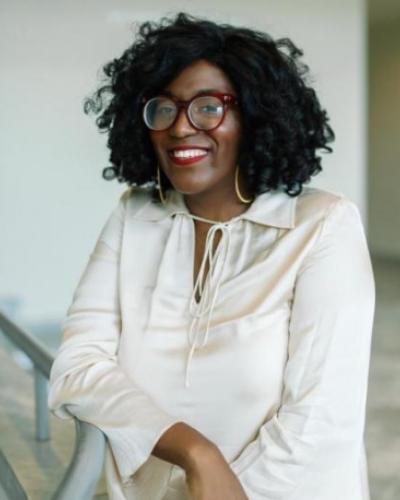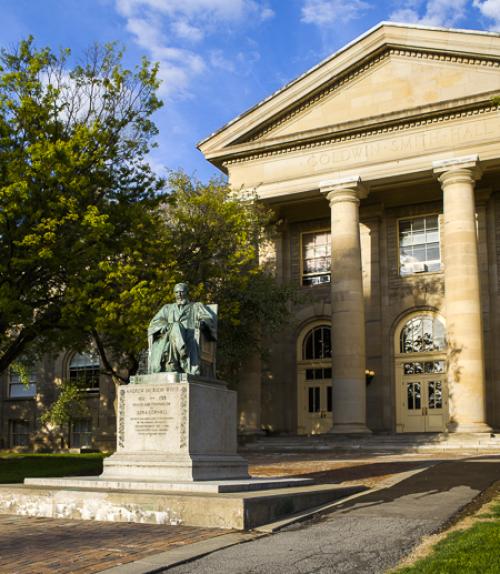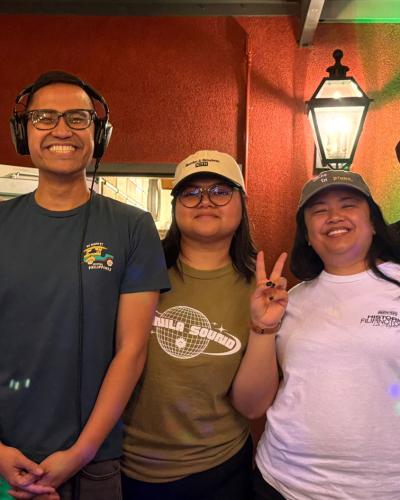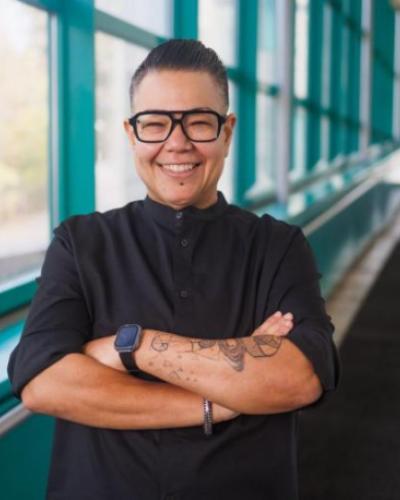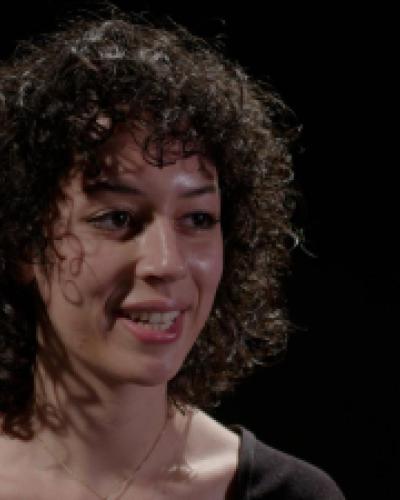Some PMA majors elect to do a thesis film. They receive monetary and logistical support from the department to tell the story they want to tell. I spoke to Shannon O'Shea, writer and director of Burn, as well as to Fannie Massarsky, who stars in it, about their experiences creating the dreamlike short that ends with a house burning down.
Transcript
Shannon O’Shea:
My name is Shannon and I wrote and directed Burn.
I always say I was like an iMovie kid. Like when I was growing up, I learned how to edit just in iMovie. And I just fell in love with it. Editing was kind of the first part of film that I really got into actually. And I was just always wanting to make projects. Whenever I had friends over, I had this like green blanket that we would use as a green screen. And like, we just always were working on something. It was never good. But I always just had fun.
I have a really hard time figuring out how to start a story. But I tend to have a clear image in my mind, especially with film, because it's so visual, of like a shot or a scene that I want the film to end on. For Burn, I just remember being like out in Ithaca, kind of early spring walking around. And I came across these like broken down old structures that I think it was, I don't know, some kind of like industrial, like the skeleton of like some industrial building or a greenhouse or something. And I had like an image pop into my mind. It's like a burning house, as sort of the closing, or almost closing scene to a film. So for a long time, it was just a process of trying to figure out like, how to get there, because I knew I wanted to end with that. And then kind of building the story around that.
Fannie Massarsky:
So Cleo is a girl, a college student who is kind of a little bit lost right now, because her father recently died. And she did not have the best relationship with him. It was a very like tumultuous relationship, even though it doesn't say exactly what it is in the script. So she's going back to the family home because he left it to her in his will. And she's kind of jarred by that.
Shannon:
I think she kind of finds closure in the ending moments of the film. The ending voicemails hopefully will give some clues as to her direction later in life, because I feel that the future from that point on, it's just very open to her, to make whatever choices she wants now that she's kind of been set free from the past.
Fannie:
I went to a performing arts high school, and our big year where we do a lot of productions was supposed to be senior year, and that was the year COVID hit. So everything was shut down. But before that we did a lot of scene work. And I played a lot of characters that were a little bit psychotic. And honestly, I feel like I'm drawn to it. Just because it's like a good way to release my emotions. I find like characters that are kind of not really close to self, or maybe close to self in age, but not close to self and like internal processes and psyches and stuff very therapeutic to play.
Shannon:
I like films that allow the audience to kind of assign their own interpretations to them. I like films that don't really give you everything upfront. So in terms of stories I want to tell, it's not necessarily a specific story or a specific type of story so much as like something that gives the audience something to connect with while still leaving room for them to sort of project their own experiences onto it or make their own interpretations of the film. And I think films that sort of allow the value of the film to be in what the audience takes away from it, I think those types of films are really interesting.
We would sort of have meetings periodically throughout Junior spring to kind of discuss the development of the project and the idea of the project. All I really knew as I wanted to burn a house down. So there were a lot of early talks on how that could, you know, come together.
The kind of initial idea was suggested that they would build sort of a scaled down model of the house that we could practically actually burn, which was really exciting to me. I started telling people about it right away and everyone's like, “Oh my God, I want to see it happen. That sounds so cool.” I ended up finding an Airbnb, actually. We booked it for the night and shot there at night. Shot there the next morning for the final scene. And before we started filming, I sent photos of it to Fritz and Savannah and the scene shop and basically since like, the beginning of the semester, they've been building this little model. It was like, yeah, like a one inch replica like each foot was an inch maybe I don't know exactly how it works, but it was about this big and yeah, they spent like months working on it. It was incredible. I'm so grateful to them for everything in the scripts.
The fire kind of starts inside the house through a broken window. So that allowed us to have the mechanism to ignite it like inside of the house. I think they had like a rocket, model rocket ignition just basically wired into it. So yeah, and then we brought it to Jeff's house, in his yard and it was like set up on a big table, basically. And we had like, it was me and the director of photography, and a bunch of the scene shop faculty and other PMA faculty. And we set up four cameras around the model, and lit it on fire.
Fannie:
My favorite scene… the scene of the house burning down. I feel like it's very cinematic. And like symbolic of letting go of all the pain. I was there for like the reaction shots. And they just put up like two lights on both sides, and the PAs were flashing them.
And then my favorite, like acting-ish scene is probably when she's talking to the gas station man. Because like, it's so weird, it's so eerie, has like that aura of psychological thriller like a tiny bit. And I really liked when he gets her the matches, because like, the audience doesn't know if he is some kind of psychic and like, knows what she will do. Or if he's literally just giving them to her.
Shannon:
Heading into the spring, kind of getting into production mode, I was the second of the four narrative productions to go, kind of had to hit the ground running assembling more specific crew like sound people, assistant directors, assistant camera, that kind of thing. Finding supporting actors, which I definitely waited too long to do.
Fannie:
Shannon was trying to find a little girl to play the younger version of Cleo for a long while. And then we settled actually on the daughter of a professor here, Aoise Stratford. I feel like you see younger versions of characters in movies a lot. But then being on the other side of the coin and kind of like trying to think about what would it feel like to actually be talking to the younger version of yourself was really cool. And also Cleo is in a state of like, dreaming she's not, she's like half awake. She doesn't really know what's happening right now. You can't even tell if this is a dream sequence or if it's real. So playing with that was really fun.
Shannon:
We drove for like 15 or 20 minutes, had to pull into a gas station to refill the car. And I realized I need my phone to pay for gas because my phone has a sticky wallet attached to it, basically. So it's like, oh my god, guys, I gotta find the phone. We're like in a rush. I'm all stressed. We're unpacking the car. I'm like getting equipment out of the car. I cannot find the phone. I'm like, obviously it's somewhere in here. I didn't just like leave it in Aurora in the parking lot like it's definitely in the car. So Fannie like pulls up Find My iPhone, and she let me like sign into my Apple ID on her phone. And we pinged it so it starts making the beeping sound and I'm like, why does it sound like it's coming like from up high. And I get on my tiptoes and discover that I drove for 20 minutes with my phone on top of my SUV.
Fannie:
It was just fun. Overall, it was good experience. The only thing is it was really cold the entire time. But it's okay!
Shannon:
I felt quite bad about the cold. I really did. I'm very grateful to everyone for their time and for putting up with that.
And now I'm in post-production.
Fannie:
I feel like that's the most exciting part, like in a movie process, just seeing all the… because we didn't film it sequentially. So just seeing everything kind of fall into place is exciting for me.

